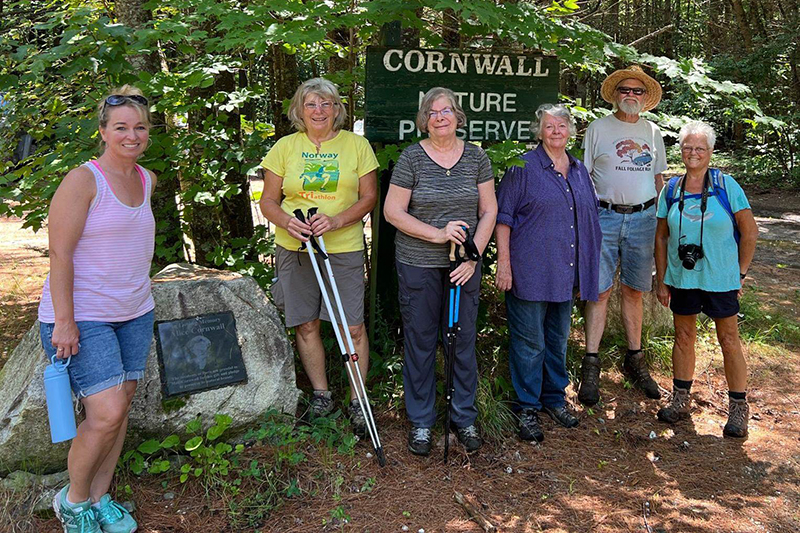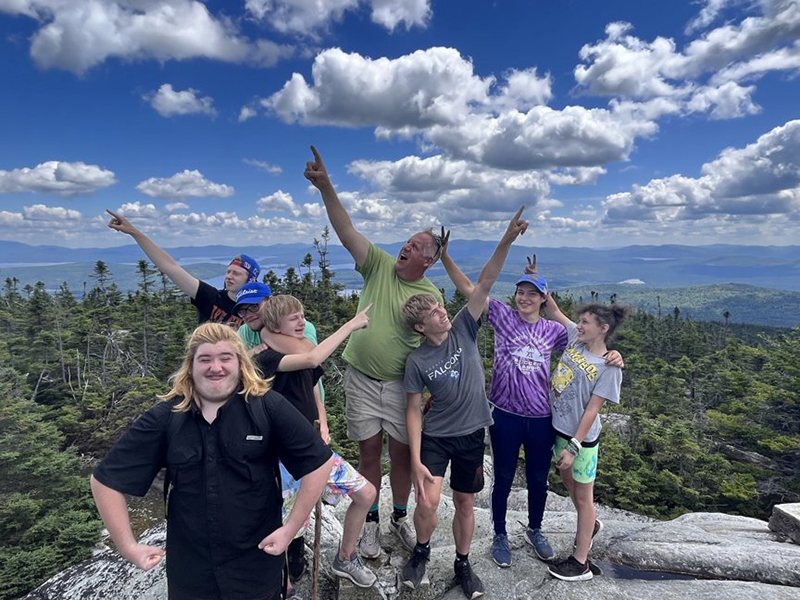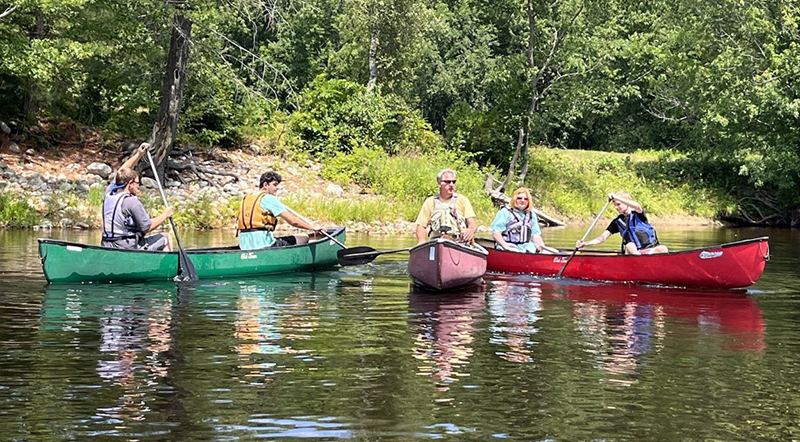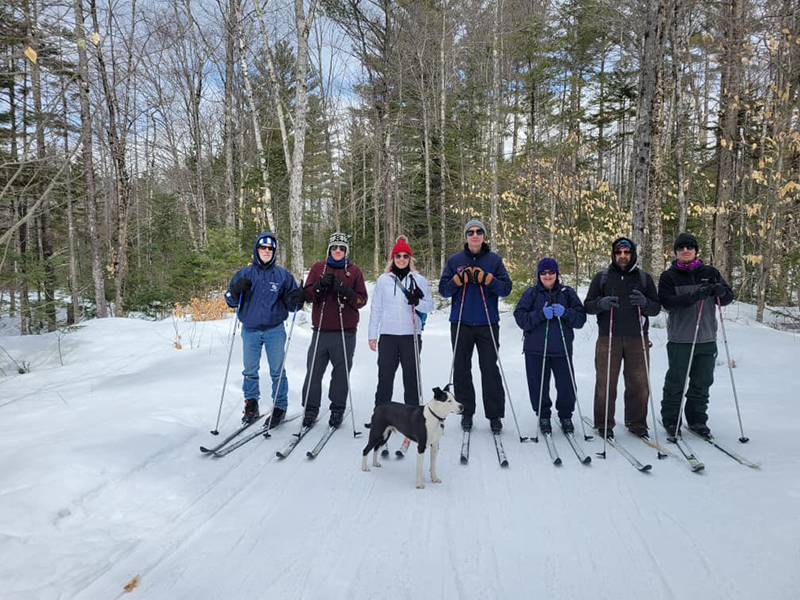A few years ago, a regional coalition of groups within the Maine West partnerships – including land trusts, watershed associations, and healthy community and education groups – met to develop a shared conservation and recreation plan for a 27-town region in western Maine. They shared a goal of giving more people the chance to enjoy the health benefits of time spent outdoors in nature, especially those not already participating in outdoor recreation, says Mike Wilson, senior program director for the Northern Forest Center, which facilitates the Maine West initiative. The participants also set a goal to expand community support for local conservation by attracting people who don’t see themselves as the outdoorsy type. They hoped to welcome new people to benefit from time with others on trails, rivers, lakes, and open spaces.

At first, they offered a hiking challenge to give people the opportunity to “give back when you go outside.” The Second Nature Adventure Challenge promised to donate money to local food pantries if people from the region recorded a certain number of outdoor activities over a set period. The Second Nature Challenge helped secure funding for local food pantries and later for after-school youth programs, but organizers found that most of the participants were people who were already recreating outdoors.
“We weren’t seeing a real increase in nontraditional folk,” Wilson says. So, they shifted gears. “We started digging further and connected with local organizations who were working directly with underrepresented populations.”
They found partners willing to take the lead and created three new programs: one designed to get people 50 and older out for “wellness walks,” a second for at-risk high school students, and a third for people in recovery from substance use disorder. With funding from the Betterment Fund and a U.S. Department of Agriculture Rural Community Development Initiative grant, they partnered with three different established groups.
“The strategy we’ve hit upon is going to the groups already working with these populations,” Wilson says. Potential participants wonder whether they can trust this experience to be safe and fun, and they want to know who is sponsoring the event since they’re not likely to engage with an organization they don’t know.
For the past two years, Maine West has successfully run the three targeted programs. The Senior Wellness Walks address one of the barriers to hiking in the woods – fear of walking alone. A local group already working with seniors agreed to coordinate group walks, inviting older adults to get outside and walk as a group. Participants were given safety whistles, purchased through grant funds. The walks serve another purpose besides providing exercise and time in nature – a chance for adults to socialize. In May 2023, the U.S. Surgeon General declared loneliness in America a public health epidemic, and leaders of the senior wellness walks reported participants forming friendships that kept them coming back.

For the youth program, called Falcon Camp, organizers teamed up with a regional school district that had high school teachers with the skills and inclination to take the lead on a program. There were two teachers, one who was the school’s physical education teacher and ran an outing club, who had relationships with the school administrators and students.
“We made it easy for the school. We had an idea and the money and a connection to two people in the school,” he says. Maine West coordinators just needed the administration to agree and recruit students.
The school identified a dozen students dealing with some personal challenges who would benefit from an outside activity. Students were given a golden ticket and told they were selected to be part of a special two-week summer camp experience that provided training and experiences canoeing, hiking, and mountain biking. They’d be given skills training and supported by teachers at their school whom they knew. The school provided transportation and meals, and Maine West paid for the rest.

Some of the kids had never spent a night away from home or paddled a canoe, Wilson says. The organizers faced pushback from some parents relating to whether they could trust that their kids would be safe and the logistics of the trip.
“The first year was very challenging,” he says. “You can’t just put the word out that we’re going to have a bike-skills training for kids and expect this particular cohort of kids to show up. It’s much more hands-on.”
In the end, eight to 10 teenagers participated in each of the past two years and had a rewarding experience – learning to mountain bike, paddle a canoe, hike, camp, cook outdoors, and look out for each other. Since the trip, the teachers and administrators have seen marked behavior improvements in some of the kids; some are more willing to engage and make connections with other kids in the school, he says.
With the third group, Maine West staff partnered with groups working with people in recovery. Through the first two years, organizers learned it’s crucial to provide peer support to participants. This person should be someone who has been in recovery themselves and has experience working with this population, Wilson says. You can’t assume that just getting people out into the woods is all that’s necessary for people to have a good time and feel refreshed from the experience, he says. Grant funds were used to give the adults equipment like backpacks and fishing poles to enable them to continue to participate in outdoor activities on their own. Participants fished, hiked, and learned archery.

“It’s hard to know what’s going to come up. It’s important you have people there who have skills to support individuals and the conversations that come up,” he says. “It’s really just a pure experience. It’s a way for people to get together with others who are managing similar issues, to get out in nature, exercise, and have support if it’s needed.”
Allie Burke, executive director of the River Valley Health Communities Coalition in Rumford, Maine, works with all the populations involved and has been a key part of helping develop the Maine West program.
“We often talk about ‘wrap-around services’ like housing, food, transportation, and employment, but those don’t address the value of connecting with others and time in nature,” she says. “When we see people engaged in the outing programs, you see a happiness and a peppiness. It’s another kind of wrap-around service that is going to benefit people in the long term.”
For Wilson, one of the big takeaways from the last two years is that the process of conserving land and building trails doesn’t guarantee that the whole community is going to participate and benefit from being outdoors. “If you build it, they still might not come,” Wilson says. “If people are not already participating in outdoor recreation, that means there are barriers,” he says. “Until we build the right relationships and collaborations, we won’t be able to understand and overcome those barriers, and we won’t expand participation in recreation to benefit our whole community.”